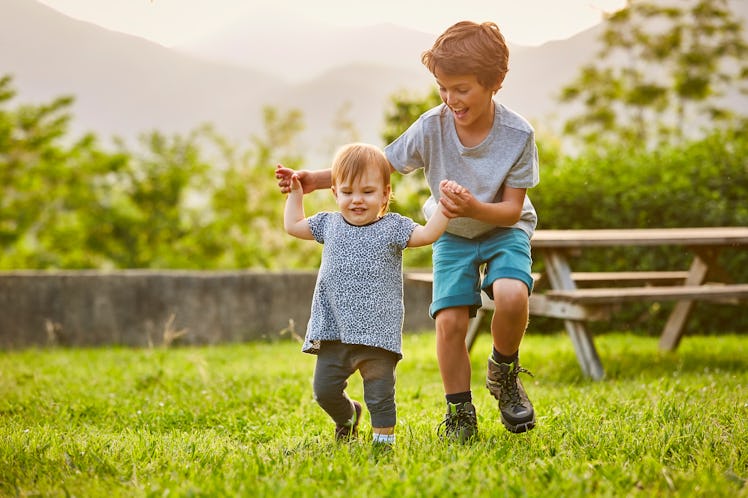Are ‘Good Kids’ Ever Truly Selfless Or Generous?
Whether children are capable of true kindness — and, indeed, whether altruism even exists among adults — is hotly disputed by researchers.

When my 2-year-old son sees his newborn sister crying, he toddles toward her bassinet, wraps her in a suffocating hug, and presses his drooling lips against her cheek. He’s comforting her in his own way, and it’s certainly sweet. But is it kind or altruistic? Does my son care, or is he mimicking his parents, playing a game, and selfishly seeking a reward for acting like he’s emotionally engaged? I know what I want to think. I know what other parents want to think. I’m just not sure — not deeply confident — that I can discern the motivations of my boy.
“Children often find joy in helping others,” says Gail D. Heyman, Ph.D., a psychologist who studies social cognition in children and adults at the University of California, San Diego. But she hesitates when asked about selflessness.
“It depends on how you define pure altruism,” Heyman says. “If you do something good because you want to think of yourself as a good person, is that true altruism? If you believe God will give you credit for helping, is that true altruism?”
The question get really big really quick, which is why it’s so important to return to the studies. And, let me tell you, there are a lot of studies.
Scientists have spent decades working to figure out when children develop helpful tendencies. Researchers generally agree that toddlers begin acting kind and helping others by age 2, offering to retrieve dropped objects, providing comfort to whimpering siblings, and trying to shove carrot sticks into dad’s mouth (if you’re a parent, you get it). But long before then, children seem to understand the social value of acting kind.
As early as 6 months of age, infants prefer to reach for a character who helped another character in a puppet show. By 10 months, they prefer puppets that interact with helpful characters. At 1 year, many children already will point to a dropped object or try to retrieve and return it.
Unlike adults, however, young children often lack the cognitive abilities to act kindly or helpfully in situations that demand emotional intelligence. Kids have “many of the same desires to make others happy and help them avoid harm, but being able to do so in many situations involves cognitive sophistication that young children don’t have,” Heyman says. A 2-year-old who sees his mother crying might bring her a teddy bear. Cute, but not terribly comforting.
Unlike some adults, children are also thoughtlessly reactionary. If you want a drink of water and ask an adult to pass you a cracked glass, you’d expect that adult to refuse and instead offer you an un-cracked glass. This is known as “paternalistic helping” — good citizenship means helping people reach their ultimate goals rather than fulfilling their immediate requests. But small children usually lack the cognitive skills to help paternalistically. In one study of this phenomenon, researchers first confirmed that a sample of children under the age of 3 knew the basic functions of a cup, marker, hammer, and phone. They then asked each child for help in a ridiculous way; to pass them a marker to hammer in a nail. They complied.
So even very young children act kind, albeit in age-appropriate ways. But that doesn’t prove the existence of altruism, or even that kids are objectively kind. Because it is socially worthwhile to be nice to others — and kids know it. “It is clear that children as young as age three care about their reputations, and that this is at least one of their motivations for being kind,” Heyman says.
In 2016, Heyman and colleagues drove home this point when they reported that preschoolers who are told they have good reputations are less likely to act dishonestly. Similar studies have shown that children are concerned about appearing fair to others, and that this concern drives them to behave fairly. In the end, children certainly seem to be pursuing self-interest, rather than altruistic goals, when they act kind.
Similarly, studies suggest that children who act unkind do so out of self-interest, or desire for experimentation. “Many of the same children who do very prosocial acts also do many antisocial acts, presumably because they are especially interested in exploring how they can influence others emotions and behavior,” Heyman says.
Besides, children predominantly do what they are taught to do, rather than rely on an internal moral compass. Studies have confirmed that 5-year-olds will do what they are praised for doing, without much thought for whether these behaviors help or harm others.
So are children kind? To the extent that science defines kindness, probably.
“People use many different terms and the concept is closely related to many other concepts like politeness. Many researchers talk about altruism, and I sometimes use the term ‘prosocial tendencies,’” Heyman says. “We have both prosocial and selfish tendencies in childhood and in adulthood.”
And if you want your children to display prosocial tendencies, altruistic or otherwise, Heyman has some advice straight from the scientific literature. “Parents can model kindness and respond with approval when children do nice things,” she says, although she advises against material rewards and prefers verbal praise, instead. “Another important thing parents can do is frequently ask their children to reflect on their how actions affect the mental life of others.”
This article was originally published on